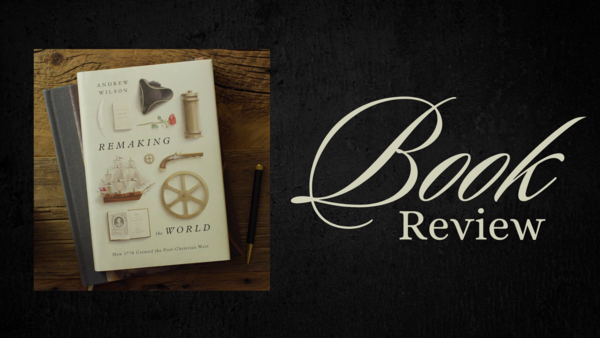By Pastor Andrews - May 22, 2024 #book review #Faith #history
BOOK REVIEW

Remaking the World: How 1776 Created the Post-Christian West by Andrew Wilson, Published by Crossway, 2023
If you’re a history buff like me, Andrew Wilson’s “Remaking the World” is well worth your time. Teaching pastor at King’s Church London, Wilson combines his historical and theological expertise to unravel the profound transformations that occurred in the late 18th century, and particularly in 1776, and how those “revolutions” shaped western development.
According to Wilson, what sets western civilization apart from previous ancient societies is that it is “weirder.” Using that acrostic to describe modern society as “western, educated, industrialized, rich, democratic, ex-Christian, and romantic,” he traces the influence of Christianity in shaping the modern west.
The author convincingly demonstrates that life in the post-Christian west is rooted in crucial events that took place in 1776. For example, “westernization” as it relates to Cook’s circumnavigation of the earth, serving as a catalyst for globalization; Emmanuel Kant’s landmark “Critique of Reason,” sparking a vast philosophical movement, Watt’s steam engine fueling the fires of industrialization, and so forth.
The extent of Wilson’s research is impressive with 35 pages of endnotes and another 15 pages of Bibliography. The incredible amount of research become obvious as you move through this historical treasure trove. Even if reading history isn’t your “thing” the wealth of information and discovery will make it hard for the average reader to put it down, especially toward the end as he saves his best material for last.
The last section beautifully relates how the grace of God, the freedom found in Christ, and the truth of the gospel can effectively meet the challenges facing the church in what some now label the “post-secular” age. Christians must be ready to answer the hard questions that secularism is increasingly failing to satisfy. Issues regarding identity, status, and truth continue to leave many frustrated with secularism’s ambiguous and empty solutions. Wilson meekly exposes the falsehoods and myths being propagated in modern culture and how they often lead to despair.
According to Wilson the need of the hour is for the church to renew commitment to the “doctrines, practices, and experiences” that have sustained her in the past. To quote the author:
Fidelity scores higher that novelty. Loss of influence is not a cause for panic. The doctrines, practices, and experiences that the church needs today are much the same as the ones she needed in the eighteenth century, the tenth, and the second. We are responsible for obedience not outcomes, faithfulness not fruit.
I enjoyed and highly recommend Wilson’s “Remaking of the World.”